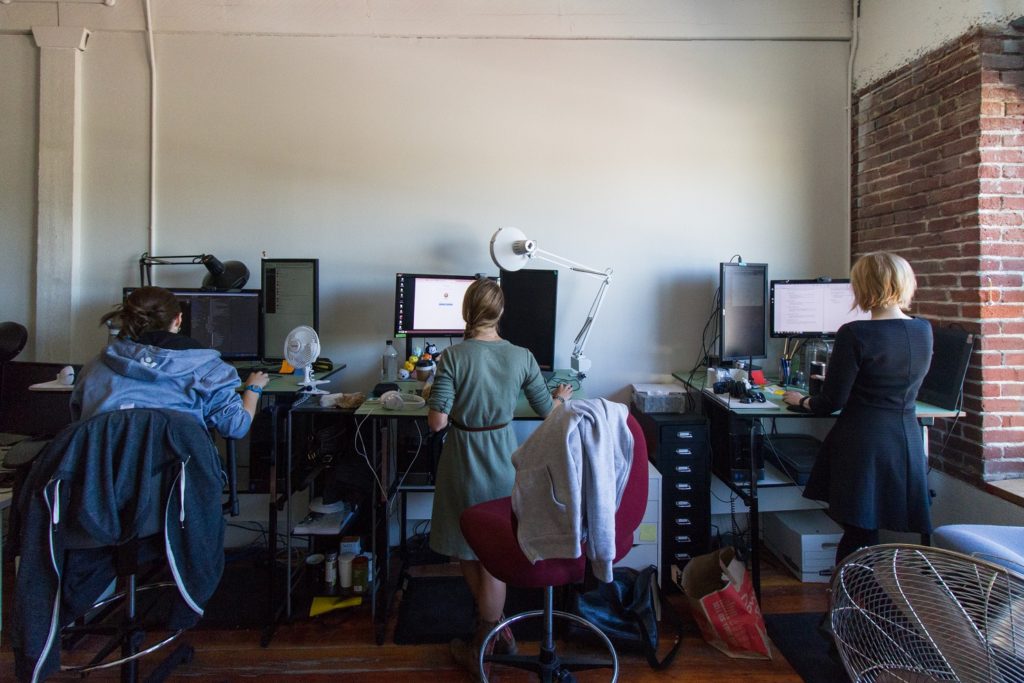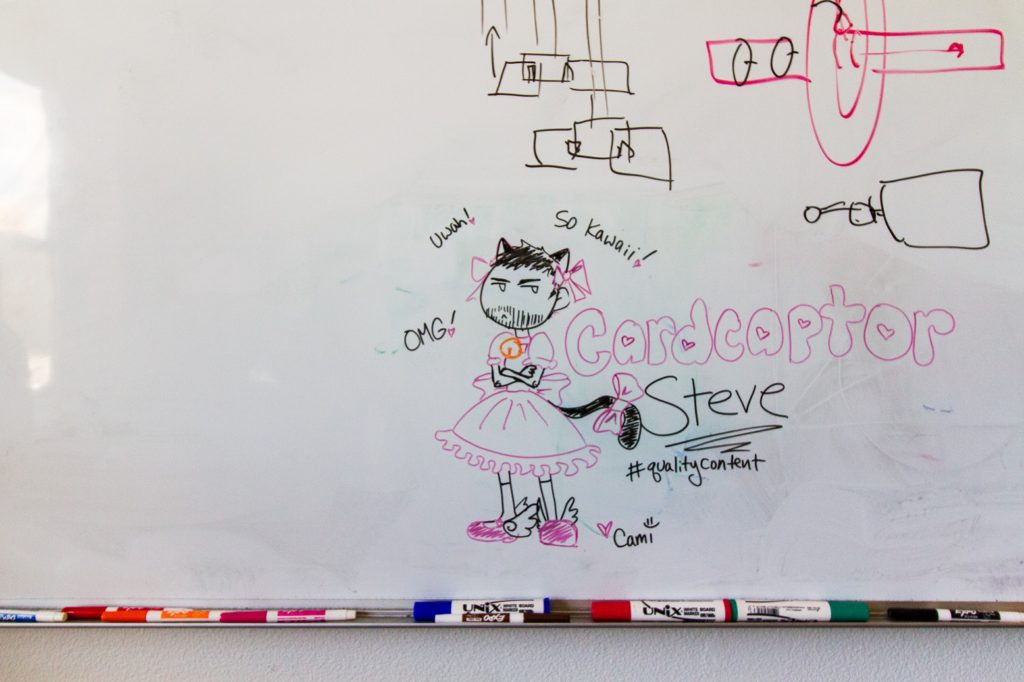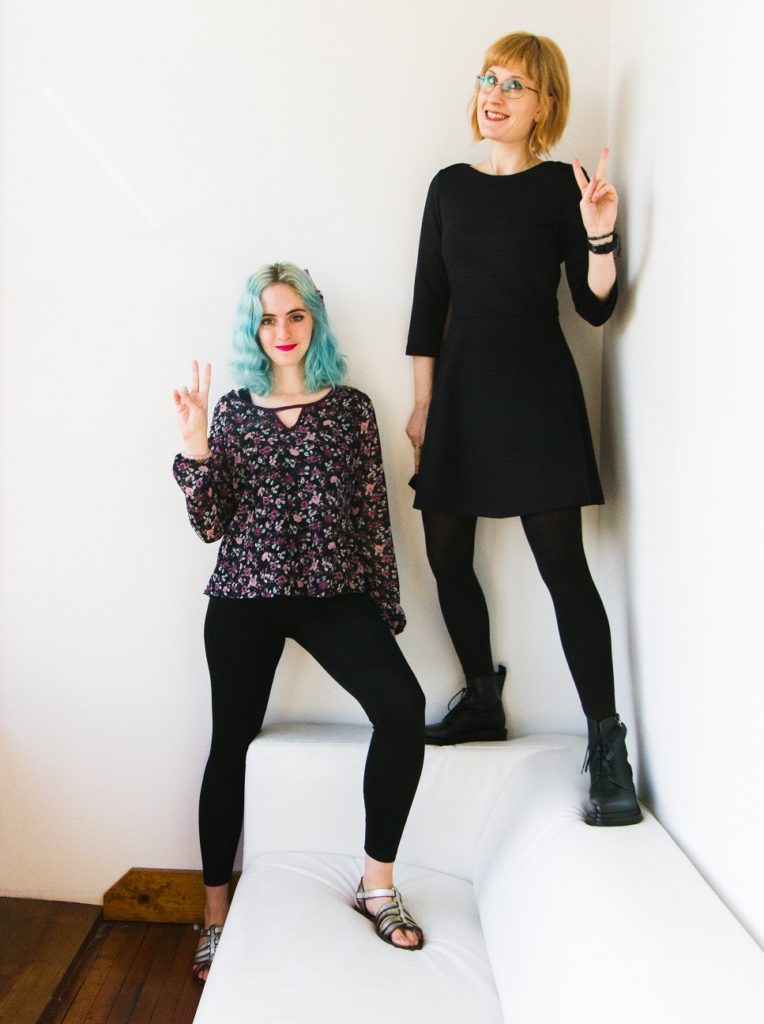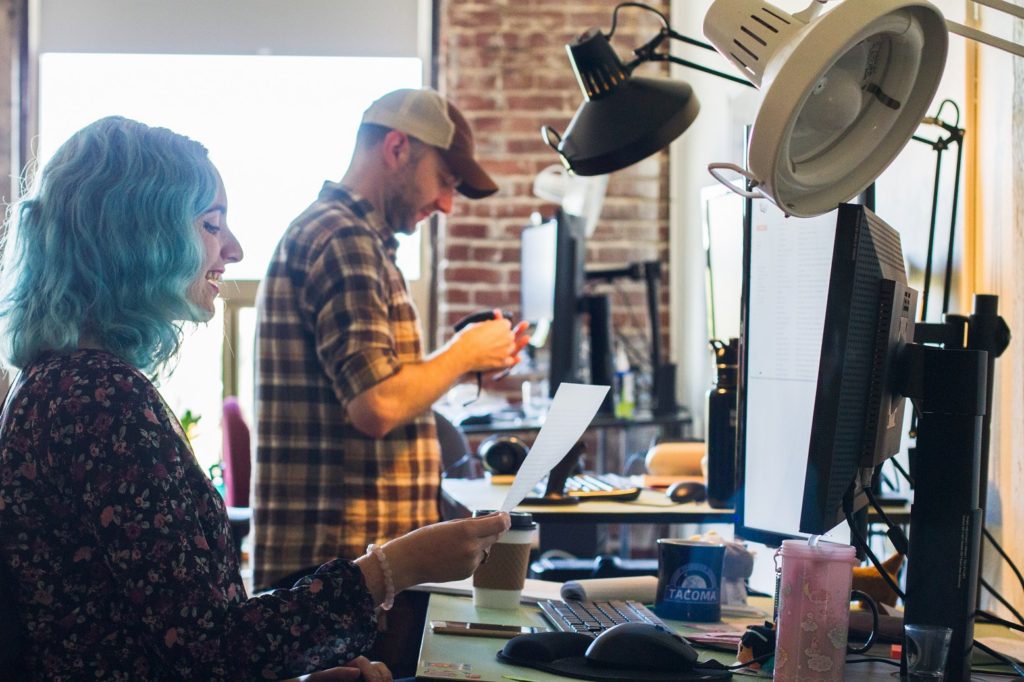This article is part of Issue 8.5, a digital zine available to Kill Screen’s print subscribers. Read more about it here and get a copy yourself by subscribing to our soon-to-be-relaunched print magazine.
///
Fullbright are best known for 2013’s iconic Gone Home. Their particular niche, now being refined with their upcoming Tacoma, is the narrative videogame: an intimate, carefully designed space left for the player to explore and unravel. Nina Freeman, creator of 2015’s Cibele, joined Fullbright last year as a level designer. Karla Zimonja co-founded the studio with Steve Gaynor. We sat down with them in their Portland office and talked about the benefits of working with a small team, trusting the player, and that pesky “woman in games” question.
KS: Nina, what was it about Fullbright that you felt drawn to?
N: I showed Steve Cibele really early on and he gave me a lot of feedback before I even had any idea that I would be working here. We kept in contact because of that and he invited me up here [to Portland] and I interviewed with them. It was basically like, what’s the equivalent of love at first sight but for a job? It was refreshing to meet a bunch of people that are excited about the things I was and to be at a company that’s a lot smaller, because I was feeling burnt out on larger companies. I always love working on smaller teams and feeling like I have agency over what I’m working on and like I can see my impact on the projects. Here I have a lot of ownership over my work while also being really collaborative.
KS: Karla, what were your initial conversations with Steve when you were looking to form Fullbright?
K: Initially we worked together at 2K Marin and that was a luck of the draw thing in a lot of ways. We were both people who wanted to continue working on [the Minerva’s Den] DLC on BioShock 2 (2010) instead of moving on to the next project. We started working together in the way we do now which is collaborating on story stuff, Steve doing the writing and then a back and forth with editing passes and stuff like that. Like Nina was saying, it was an example of a small team within a larger structure, and it was a tight-knit little group where you got to make a lot of difference to the project yourself. Then Steve went off to work on BioShock: Infinite (2013) and when he was finished with his part of that he called me up and was like do you want to move back to Portland with us and make something? I said sure; it was a time in my life where I could pick up and leave.
We all moved into a house together. It was us and we had a programmer and after a few months got Kate our environment artist. We didn’t plan very well to begin with. We didn’t understand the extent. There’s something about embarking on a project that’s super shoestring in the basement of a house in Northeast Portland that doesn’t lend itself to official thought to what you’re doing. It’s easier when there’s only a few people to fight for what you want. It’s not like we sat down and thought out a motto or anything.
KS: Do you think that level of organically being on the same page has remained as you’ve grown?
K: We’ve tried to make it so. Since we have not grown super large I think if we were to get much bigger it would start becoming much more difficult to maintain the dynamic because you start to have more management. The overhead gets larger and that’s less great. So we try to stay little so we can not have so much time spent on infrastructure.
KS: Cibele and Gone Home are very personal, almost poetic, and blend mechanics and narrative in a way that is very specific to games as an art form. How did this come into your work and is this an important element for you?
N: It’s funny because coming from having done poetry for a long time writing about ordinary life and my experiences is the norm. I think stories about ordinary life are the most interesting because naturally as people you go to the bar and want to gossip with your friends about something, you gravitate towards telling ordinary stories when you talk to other people.
K: Like Nina was saying, it’s more native to our thinking to comprehend human-scale things. Not only that but you can’t make a story in which all the things in it are generic and applicable to everyone. Paradoxically, we have found the more specific you get the more people relate to it, and that’s because we’re very good at generalizing, good at hearing someone else’s story and being like that makes me think of when I felt something like this.
N: The human stories are the best parts of those large-scale games, too.
KS: What do you find people connect to most in your games?
N: People like to see themselves in things and I can’t tell you how many emails I’ve gotten from people who are like “I was in an online relationship too!” or “My friend dated someone just like this.” People, like Karla said earlier, like to find that, relatable is a word I hate using, but relatable stuff that reminds them of something they’ve actually experienced. It’s meaningful to be able to ground a story within the context of your own life and also to be aware that it’s not entirely about you, that it’s about this character you can relate to and the game is showing you another kind of experience. I think people have been drawn to Cibele for a variety of reasons, but validation is one.
K: With Gone Home, it’s a relatively small personal story. It’s not hard to relate to your parents not getting you or thinking you’re not in control of yourself. I feel like both of us lucked out in that we make games that are relatively accessible and visually polished and distinct whereas obviously there have been a lot of personal games made before and maybe those people didn’t have as many resources as we did and were not able to make it look as fancy. In some ways I think we got in early enough and put a fancy layer on it. It’s hard to make something cross audience boundaries if you don’t have set dressing and not everybody has those resources.
KS: Do you feel it was lucky it crossed audience boundaries?
N: I think it was timing, because nobody had seen anything like Gone Home when it came out that had a BioShock level of polish but without the gamey stuff. It presented itself in a different way at the right time because there wasn’t something like that that had gotten that visibility.
K: I feel like The Stanley Parable (2013) was the only vaguely comparable thing because it was around the same time and used the trappings of another game. But yeah, honestly timing, you start making a game when you can and finish it when you can. I’m sure a lot of people plan a release but we didn’t do it, we weren’t together enough, we hadn’t done market research and thought things would align.
KS: Do you think that these specific games paving the way for everyone else is sort of the natural evolution of games?
N: I feel like, yes. Influences trickle down and become dispersed. So obviously Gone Home had a lot of influences from games that were kind of doing similar things and I was influenced by Gone Home in Cibele, and these trends pick up speed because I think people like playing games that don’t just tell them the story but they put the pieces together themselves.

K: It’s an ecosystem, you make a new niche or path available and everyone goes oh, we can use that?! It’s nice to be able to share ways of doing things that’s interesting. It’s nice when people have more tools to get stuff made they want to make. There’s something to be said for the idea of the player pulling the knowledge that they want rather than it being pushed to them. I think that helps both of us in a lot of ways because it allows for people to set their own pace.
KS: So understanding is a priority in development?
K: For me, yes. And it’s not just understanding but allowing the player to do the understanding. You can say look, I can play you voiceover that tells you what you need to understand, or I can let you put the pieces together yourself and you can connect the dots and that will be more fun. Learning is fun and figuring things out is fun. I love using that tactic to help people understand the world and characters, it’s really satisfying to give them the tools to understand things.
N: I think the commonality is telling the story through the details and the way those details fit together almost like a puzzle. In Gone Home and Cibele it is about specific people and you’re learning about the specific lives of these people. There’s embodiment in both in that you’re playing a player character who is not you and you’re coming to understand both the story of the world and the story of the player character.
K: You have to be curious enough to dig around in it. The player’s curiosity is the thing that draws them from object to object and moment to moment.
N: The other day someone tweeted they wanted to see if they could play the game without looking at all the desktops, which you can, and I was like yes someone noticed! It’s player-driven narrative, they choose to make the connections themselves and which parts of the game they want to see. Everything is here for them to engage with it. That mechanic is totally drawn from what Gone Home did. In Cibele, it’s basically Gone Home but on a little computer.
K: I think it’s not just show rather than tell, it is pull the showing rather than push the showing. I’m not serving you this cutscene, you’re taking this information to yourself.
KS: Generally as a creator what are things you have in the back of your mind or things you see coming up again and again?
N: Cibele was heavily influenced by a lot of things. Obviously Gone Home mechanically influenced it a lot. The story is based on my own life so there’s that, but Lost in Translation (2003) is basically the structure of the game. Cibele has the same basic plot where it’s about two people who meet and have this brief romance and the end is them just leaving each other and there’s not much closure. There are shots from the short films in Cibele that are taken from that movie, so that was a pretty heavy influence. Also The Virgin Suicides (1999). I like [Sofia] Coppola’s character stuff especially because she does a lot of shots where characters don’t say anything in a way that I think is cool. So I looked into those films.
Also Grimes’s music video, that really cool one that she made where they were all dressed up as warriors. That was the music video that the artist and I sat down and watched when she was like “what aesthetic do you want, what color palette do you want?” And all the poetry influences I have, obviously. I learned how to write from a poet so I can’t ever escape those influences now, forever my writing is influenced by it, specifically by the New York School era of poets. John Ashbery, Charles North who was my professor and mentor, these are all the New York-based poets who were writing in the 70s and 80s and wrote very concrete poetry about ordinary life. Ted Berrigan would write poems about getting high and what he would be eating, very based in mundane everyday stuff. Those were my primary influences for Cibele and also things I think about a lot as a storyteller.
K: I feel like I don’t get asked influences or stuff like that often.
N: I rarely get asked it either.
K: It’s not a common videogame question at all.
KS: I’m sure you get asked about this, so do you think it’s bullshit that as female game developers you’re asked to be arbiters and representatives of not only our gender but all female game developers?
N: In the aftermath of Cibele I was doing a lot of interviews and this came up in every single one. “What’s it like to be a female game developer? It must suck a lot.” I was like, I’m the wrong person to ask, because I’ve always worked on tiny teams with friends and then I came here and I knew that I was coming into an environment that would be a positive space. I’ve always been in a position where I haven’t had to work with anybody that I’m uncomfortable around, so I’m always the wrong person to ask because I’ve never had a bad experience.
When I first started making games my boyfriend also made games so sometimes I felt like people would look at me and be like oh she’s just doing this because of him, but that stopped happening pretty fast when I actually started making stuff. It’s annoying but it’s also fine because I get to give my answer which I’ve developed over time. I always say that my goal is to change the conversation around my work at least, I don’t want to be known as a female game developer but I want my games to be known.
KS: It’s still a way of pigeonholing women.
N: Exactly. For me changing the conversation about how I work on games is more important because there are plenty of women making games, but usually they’re only talked to in terms of this issue when they should be asked about –
K: Anything else!
N: – right, so I take that question and I’m like, it’s fine that you’re asking me but I’m going to tell you to ask about their work instead because that’s going to be more helpful. The biggest issue is none of us can talk about our work, we can only talk about our gender. I obviously have gained enough visibility that I don’t have to talk about that as much anymore because I’ve worked really hard to change the conversation around the stuff that I work on, so it comes up a lot less often than I used to. But it takes a fuckton of interviews to get to that point. It sucks but you just have to work hard to make sure the focus is on your work and not you as a person, because it’s still about the games. It’s not about me, it’s about the games that I make.
K: Firstly, it’s meaningless to ask someone what it’s like being them. I only have my own perspective. How can I tell you what it’s like to be me? It doesn’t mean anything. And also Fullbright is very white. We are not the frontier here. We have more work to do in that regard. I am lucky enough to be co-owner of a studio that is more than 50 percent women but that is because we did that on purpose. Back on Gone Home I was like we’re half and half, we should keep this ratio if we can and I was actually kind of worried about it, when we started hiring people I was like how are we going to keep this ratio? Because women tend to leave the game industry. We were lucky enough to find a lot of really good people. But we did actually have to do that on purpose.
KS: What are the benefits that have come from maintaining that ratio?
K: It’s always good to have more perspectives present because then you don’t end up your own ass as much. If you think something is a default, maybe someone else doesn’t, and that is a chance for you to not make the same choice that everyone would make and make something different. There’s a lot of people that don’t get to have a say when they’re making things and we’re lucky enough to be able to allow our people to actually influence the stuff that we’re making. That makes everybody’s work better. It’s simple.
N: I was in the startup scene in New York and I was on a team that was almost all dudes but they were working hard to hire more women. When I was at Kickstarter the conversation was “How do we get more women?” and thinking about that all the time is stressful. If you’re on a team of all men and they want to do that, it’s good, but it’s stressful to be the only woman in the room in this situation.
K: Because everyone looks at you and goes how do we do it, how do we get a woman?!
N: You’re the one point person on that sort of thing. I’m not that anymore which is really relieving. I can actually think about things other than activism and stuff, and I used to be way more involved but I’ve have moved away from it because I noticed that being involved in it made my work be about that. Since I’ve moved here and since working on Cibele my main focus is just making stuff. I feel like I’m at a point in my career where I want to focus on becoming a better game designer and that’s more important to me than anything else. And there’s people who do [activism] really well, who make that their job, and I’m like thank you. I can go do my thing and that’s totally okay.
K: I remember when I was in Triple-A I could see myself learning bad habits because dudes would do things and you’d have to react to work in that system. I learned to shout over people in conversations because dudes do that a lot, and you have to learn to interrupt right back or you don’t get to speak. So for the past five years I’ve been trying to unlearn that because it’s not cool, but I had to do that at work. And just thinking how we don’t have that environment now because we’re shaping it more intentionally and that’s not our company culture. It’s so good and gratifying, I’m sure we’re falling down in some other way but it’s really nice to be able to talk to each other and not have bad conversations.
N: Everybody gets their word in even if they’re not directly working on it which is cool, so like you were saying it’s nice to get everybody’s perspective on something to have a lot of different ideas flying around. I feel like when we have group conversations that happens.
K: We do try to make our games accessible so it’s nice to hear from everyone so we have a range of gaming hardcoreness and things that people value. Everyone has good ideas.
N: And I don’t think anyone is ever too intimidated to share their opinion. I’ve always felt that way in work and school. I’m a quiet person, and an introvert generally, but even I feel like I can share my stuff here. Everyone is at a different range of how we’re comfortable communicating and everyone here shares despite how different we all are.
KS: Would you agree that your games are feminist?
K: Yeah, yes. We are, I am pretty sure we are all feminists around here. Yes, we have feminist viewpoints, therefore the works we make are feminist.
N: I agree, that’s how I think about it. Some writers are like I am explicitly making a feminist piece of fiction, but I have never done that, it ends up being feminist because that’s my ideology. For me, and probably all of us, it’s more like that. Because it’s not like we’re sitting here thinking about “How can we make this more feminist?”
K: We are like what is this character going through, is this a cliché, what does this say about this character, what can we avoid?
N: And the cast of Tacoma is variously men and women of different races, which is intentional.
K: And it’s more women than men, and that’s how it is, and it’s awesome.
To read more of Issue 8.5, be sure to sign up to become a subscriber to our redesigned print magazine.




